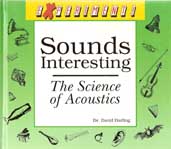SOUNDS INTERESTING: The Science of Acoustics - Glossary
cochlea
A snail-shaped structure in the inner ear in which sound vibrations are changed to electrical signals before being sent to the brain.
cochlear implant
A device that is placed inside the ear during an operation. Part of the cochlear implant picks up sounds outside the ear and changes them to electrical signals. These then travel along fine wires to the cochlea.
Doppler Effect
The effect by which sound (or light) waves are crowded together if their source is moving toward you, and spread apart if the source is moving away.
ear canal
The passage leading from the outer ear to the eardrum.
eardrum
The thin, oval-shaped piece of skin which lies at the boundary between the outer and middle. It vibrates at the same frequency as the sounds which fall upon it.
echo
A sound that has bounced back off a hard surface to be heard shortly after the original sound.
energy
The ability to do work or cause movement.
frequency
The number of times a wave vibrates in a second.
hertz
The unit of frequency. One hertz equals one vibration (or �cycle�) per second.
inner ear
A connected series of tubes and passageways in the skull which includes the cochlea and semicircular canals.
middle ear
An air-filled space which contains a chain of three tiny bones � the hammer, anvil, and stirrup. These transmit the vibrations of the eardrum to the inner ear.
outer ear
The part of the ear you can see from the outside, together with the ear canal.
pitch
The highness of lowness of a sound.
sampler
An electronic device that can record real sounds and store them in the form of a series of numbers. These stored sounds can then be combined or altered using a built-in computer.
semicircular canals
Three looped tubes in the inner ear that are joined together and contain a special liquid. They play an important part in our sense of balance.
sonar
A method of finding the distance and speed of an object by bouncing sound waves off it.
sonic boom
The loud noise made by a plane or other object as it goes past the speed of sound. It is caused by the plane breaking through the compressed air waves that built up ahead of it.
supersonic
Meaning "greater than the speed of sound."
synthesizer
An instrument that can create almost any sound by combining simple sounds electronically.
timbre
The quality of sound made by a musical instrument. It depends on the mixture of the basic note with other frequencies that are present.
ultrasound
Sound that is too high in frequency to be heard by the human ear.
vocal cords
The stretched pieces of skin in the human throat which vibrate and make sounds when air from the lungs is forced over them.

